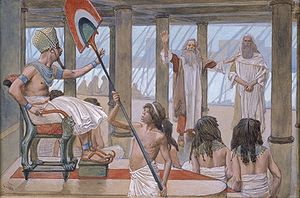 Image via Wikipedia
Image via WikipediaIn response, God enabled Moses to perform supernatural signs, miracles, to convince his people that God had spoken to him. Well, Moses couldn't object to the power of the signs but immediately after performing them, he again brought up his perceived inadequacy for this job. I really love this quote: "Please Lord, I have never been eloquent, neither recently nor in time past, nor since Thou hast spoken to Thy servant ... " Exodus 4:10. Again, Moses focused on his personal weakness.
God assured Moses that He could handle that, but even then Moses asked God to send someone else. God still left Moses in charge of the operation but called his brother Aaron to assist him. Moses is pictured here as such a reluctant and discouraged leader.
Obediently, Moses and Aaron did speak with Pharaoh - demanding that the Israelites be permitted to travel three days into the desert in order to worship their God. Pharaoh openly scorned Yahweh and increased the work load on the Israelites. As their suffering and hardship increased, the Israelites no longer worshipped God or thought about the plan He revealed to Moses. Rather, they, too, harshly criticized Moses and Aaron for approaching Pharaoh. Even more disheartened, Moses complained to God and focused on the troubles he and his people were having in Egypt while the people of Israel blamed Moses for their new hardships. In fact, it probably seemed to Moses, with all of these new problems he was having, that God was not as powerful as Egypt.
When God responded to Moses, He revealed Himself as God Almighty. He spoke of the covenant He established with Abraham, Isaac, and Jacob; He said that it was now time to move to the land of Canaan.
In Genesis 15:13, God did tell Abraham that his descendants would be abused for four generations in a foreign land, but that He would deliver them out of that land. In the time of Moses, it would appear, that many in Israel had forgotten God's prophecies and His covenant with Israel. It seemed that neither Moses nor his people thought much about returning to Canaan.
When Moses spoke to the Israelites the second time, they refused to hear about God's covenant promise with Abraham, Isaac, and Jacob to give them the land of Canaan. He was now regarded as their trouble maker. When God told him to speak to Pharaoh again, Moses focused on his shortcomings ("faltering lips" Genesis 4:12) rather than on the Almighty God who just revealed Himself to him.
Moses simply could not see past his own weaknesses or failures. But in these passages we see that God chose Moses, not because he was clever, brave, handsome, eloquent, smart, etc. rather simply because His has the sovereign right to choose who He pleases for whatever purpose He created for that person to fill. The most timid and reluctant of men became one of Israel's greatest leaders.
When men submit to God's will or purpose in their lives, God Himself provides all that men lack. I believe, that when we focus on God and His Word rather than on our own shortcomings, God works more efficiently in our lives. While we live in God's workshop, our lives, similar to workshop projects, may look scattered, in pieces, or disorganized. However, when the instruction or blueprints are followed, these pieces come together to form something new and beautiful. In the midst of difficulty and trouble, as God shapes and works in our lives, the hopeless and shattered elements will emerge transformed into God's perfect will.
God reminds us not to trust in what we see but to trust in His wisdom, to trust in what God sees.
On a different note, in Exodus 4:23 God (speaking to Pharaoh) says: "Israel is my firstborn son, and I told you, "let my son go, so he may worship me. But you refused to let him go, so I will kill your first born son." God warned him up front about His plan, but Pharaoh thought so little of God that he didn't take any of this seriously. In the end, God did take the lives of all of the Egyptian first born. I think that it is very important to take God at His word - when He says that something will happen, it is imperative that we believe Him and act on it.

No comments:
Post a Comment